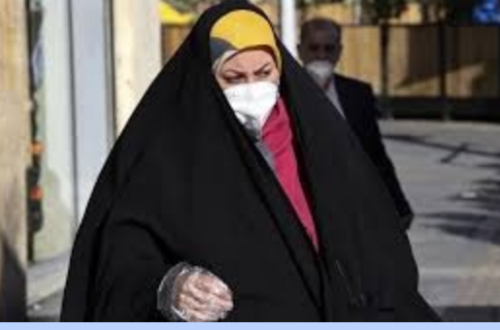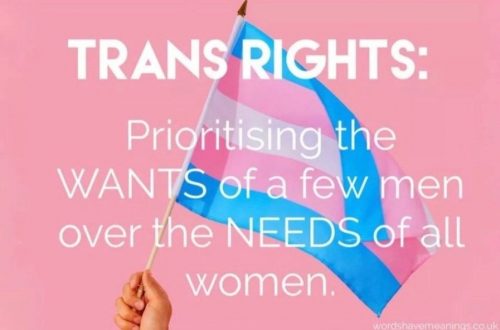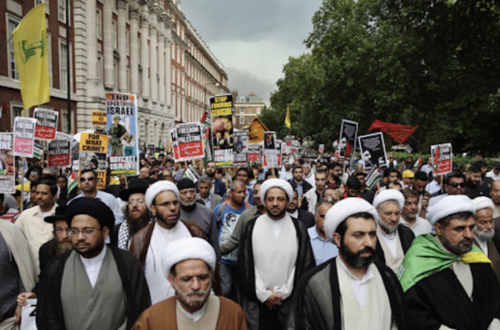This is a Guest Post by Elcid Asaei
University College London Union has defied calls to cancel a provocative talk organised by the Ahlul Bayt Islamic Society, stoking up anger from students and the Iranian ex-patriot community who accuse the University of fermenting Islamic extremism and implicitly condoning the brutal actions of the regime in Iran.
Entitled, 1979 – The Revolution that Shook the World, the event takes place on the 11th of February, coinciding with expected protests and possible fatalities in Iran on the penultimate day of the 11 Days of Dawn, which mark the return of Ayatollah Khomeini and the 1979 revolution.
Attending, the guest speakers include Islamic convert Yvonne Ridley from the controversial Iranian state-owned 24-hour broadcaster Press TV, which is currently under an Ofcom investigation for breaching the code of conduct.
More controversially still, the event has earmarked a seat for Dr Mohammad Marandi from Tehran University. Marandi has stated his support for the execution of protesters, and recently condoned the execution of Mohammad Reza Ali Zamani and Arash Rahmanipour who was aged as young as 19, saying on Al Jazeera “there isn’t much sympathy for these two people.”
Potkin Azarmehr, a popular Iranian blogger described the decision by James Hodgson, the student activities officer, as cowardly on his Facebook page. “When UCL holds such events, is it any wonder it produces terrorist graduates”, he wrote.
Revelations of this latest controversy come hot on the heels of damaging allegations that UCL is rife with Islamic extremism, following the failed terrorist bombing on Christmas Day by Umar Farouk Abdulmutallab, who studied at UCL and was the president of the Islamic Society in 2006-2007, the second Islamic society at UCL alongside Ahlul Bayt.
An investigation by The Sunday Telegraph in January disclosed the number of radical Islamic preachers who’ve attended talks held in the Darwin Lecture theatre, which ironically include “Muslim radicals who have challenged the theory of evolution”.
Of the keynote speakers invited, one had “suggested that homosexuals and opponents of Islam should be killed”, reports The Telegraph. Abu Usamah, a preacher at Birmingham’s Green Lane mosque had been filmed in a 2007 Channel Four documentary, where he praised Osama bin Laden and said: “If I were to call homosexuals perverted, dirty, filthy dogs who should be murdered, that’s my freedom of speech, isn’t it?”
Freedom of speech is something Hodgson had underlined as the main reason for giving the go-ahead to the event, saying “we have a moral and a legal duty to uphold freedom of speech on campus. The two speakers in question may be controversial, and I realise that their words have caused upset amongst the Iranian community in London, but by cancelling the event we would only be stooping to a level that restricts freedom of speech and freedom for individuals to express and formulate their own opinions.”
He added: “I would like to make it clear that UCL Union is one of the few unions in the country that does not have a ‘No Platform’ policy for speakers. This means that we will let all speakers on to campus so long as their opinions are not illegal.”
The comments were followed by uproar from the Iranian ex-patriot community, activists and students who had lobbied Hodgson to cancel the event, citing the decision as damaging to UCL’s credibility, insensitive and inflammatory.
Feminist artist and political activist Claudia Claire who emailed Hodgson, expressed dismay at the decision: “[He] talked of ‘open dialogue’ and ‘controversial views’ being ‘challenged in public.’ But the event is not openly publicised. I just checked again on the UCL website and there’s no sign of it.
In effect it’s not actually open to the public. It much more closely resembles a closed meeting … It really does start to look like UCL SU [is] collaborating with the murderous intentions of the regime, inexcusable even if it is done unwittingly”, she added.
Speaking in The Times, Anthony Glees, director of intelligence and security studies at Buckingham University, has talked of the need for “a new drive to combat extremism on British university campuses.”
“Radical extreme views are so much part of the diet of Islamic student life that people can no longer tell the difference between legitimate dissent and hate propaganda designed to brainwash,” said Glees.
This latest controversial event has placed great pressure on UCL. Speaking to Dominique Fourniol, Head of Media Relations at UCL, he denied it was a university matter, saying “it’s important not to confuse the union with the university.”
Yet he disclosed information on “review” chaired by UCL President and Provost, Professor Malcolm Grant, into the actions of UCL Union, following the Abdulmutallab controversy.
However this event for many Iranian students is yet more painful, following the seminar on culture and politics at Durham University on the 28th of January, which the Guardian reports “was funded by the Iranian state, but boycotted by the main speakers and all Iranians at the university.”
Writing in his daily weblog, Potkin argues that such regime-sponsored events are not an isolated case, but prevalent throughout British universities. Highlighting SOAS lecturers Dr. Anna Contadini and Mohammad Abdel Haleem, both of whom are pictured receiving awards from Ahmadinejad, he writes: “No one has betrayed the Iranian pro-democracy movement more than UK universities and academics.”
Amir Biabani, an Iranian student at Queen Mary university, and an events’ organiser for University of London Iranian Society was “totally shocked” when he first came across the event three days ago, through a friend working at UCL Union.
“As a Muslim myself I believe what they are doing is wrong” says Amir, and he adds that he is leading 30-40 students to the event to voice their opposition and show the regime that, “wherever they go we are there, and we are countless.”
So far there has been no comment from the Ahlul Bayt Islamic Society or the UCL Iranian Society, both of which have refused to comment.


